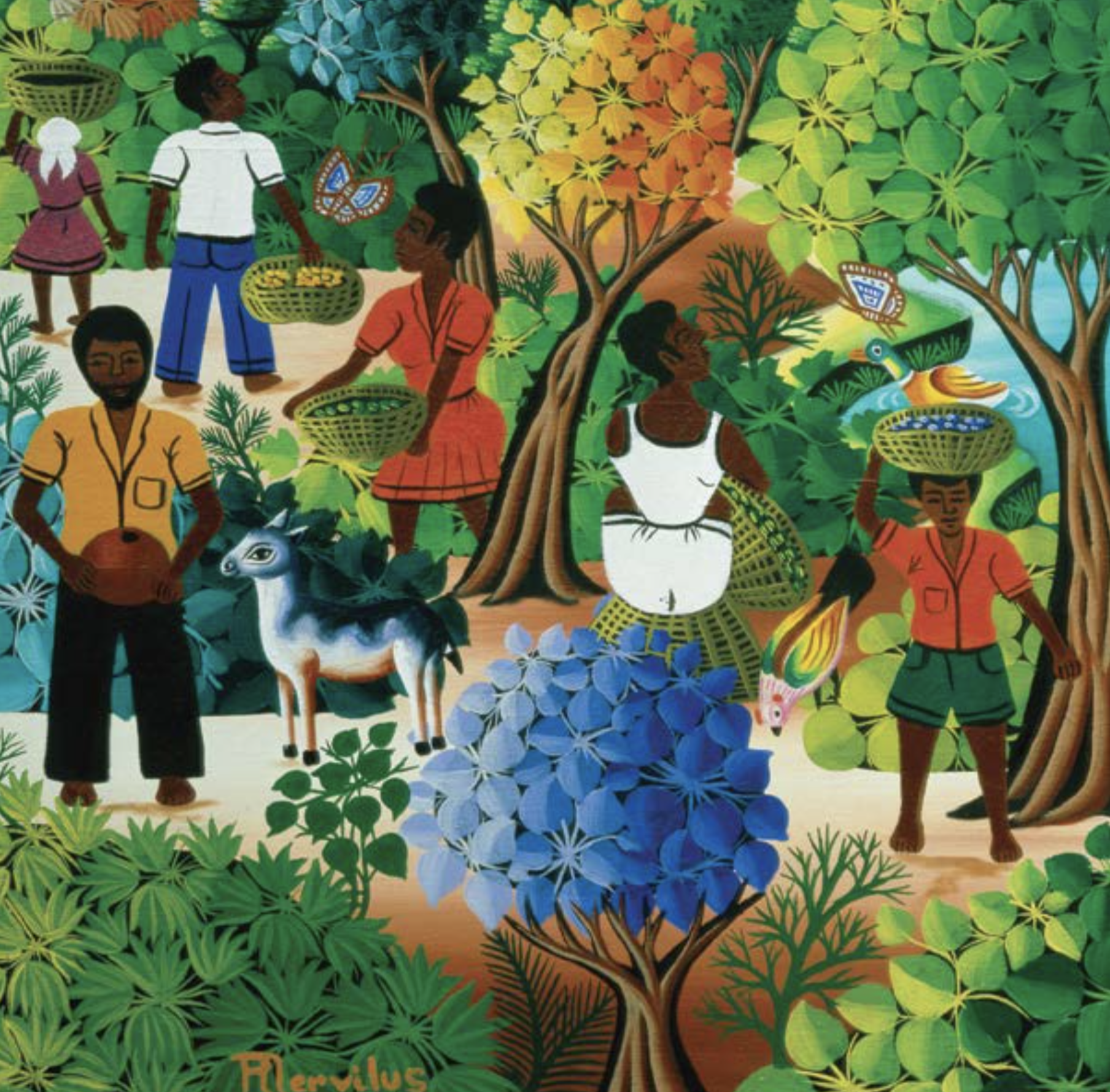“Love Is Shining in My Heart for You, Dear Haiti”

“Haiti is the poorest country in the western hemisphere.”
That was the only fact about Haiti that my teachers drilled into our heads. This brief description was taught to me in every history class during my elementary, middle, and high school years, and was only mentioned when learning about the great Christopher Columbus.
I am from New York, where Columbus Day is an observed holiday. Specifically, I grew up in Southeast Queens, home to a large Haitian population where many of my classmates were Haitian and from other West Indies countries, but our teachers were white. These repeated statements about Haiti’s poverty from my teachers were given in the context of learning about colonization and the discovery of the New World. What made these statements so tragic is not that my teachers were wrong (Haiti is the poorest country), not that they failed to offer any context in understanding the complexities of French colonialism and U.S. occupation, and not even that this fact was rooted in American paternalistic ideology.Ê
The sadness of their statements is that I actually believed what my teachers said about the country of my parents’ origin — and believed they were the only things I needed to know.
My parents arrived in New York in 1969, escaping the repressive regime of Franois “Papa Doc” Duvalier. While my father loved his home country he struggled to provide financially for his growing family. At the time, because of the number of young men serving in the Vietnam War, individuals with specific skills were encouraged to apply and obtain visas to enter the United States. My father was a trained auto mechanic and my mother was a seamstress. Upon their arrival they immediately became occupied with striving for the American Dream, providing for and raising six kids while learning the American system.
Although my parents are Haitian to the core, their childhood in Haiti was not the best. Both of my parents had to drop out of school in junior high because of financial and personal issues. This lack of education was embarrassing and painful for them and became symbolic of all the opportunities they were not given in Haiti. Their pain turned into silence and they became unable to share beautiful memories and aspects of Haitian culture with us. I understood that my parents came from this faraway country but all I knew of this place was that it was the poorest country in the western hemisphere. So this cultural hole, along with my teachers’ miseducation in choosing to only teach about Haiti’s poverty, led to a feeling of disgrace, humiliation, and embarrassment. In addition, during my childhood I experienced cruel teasing from my classmates, chants such as “Haitian creation go back to your nation,” being asked what size boat my parents came here on, and slurs like “HBO” stood for “Haitian Body Odor.” All these and more reinforced feelings of embarrassment and inferiority.
I recently pondered the 2010 comments from Pat Robertson where he stated that ever since Haitians defeated the French colonists in 1804, “they have been cursed by one thing after the other” because they “swore a pact to the devil.” And the even more racist and disgusting remarks recently by Donald Trump when he referred to Haiti as a “shithole” country. Anti-Haitian propaganda runs deep in our society, and has been used to justify everything from military invasion to anti-immigrant xenophobia. As teachers, specifically history teachers, it is critical that we counter this propaganda and present the complete and hard truth to our students.
“Beautiful Flowers Bloom”
There is a song that my husband sings any time a person mentions Haiti. It is a beautiful love song that he memorized and uses to express the love he has for the country his parents also emigrated from and where he was fortunate enough to spend much of his childhood. As we shared our childhood memories with one another, I began to see Haiti through his eyes. I reflected on the trips I had taken and used my new lens to re-experience the beauty of Haiti’s people, culture, and history. This song, our family trip to Haiti in 2014, and our conversations have allowed me to learn truths I wish my teachers had taught me:
Oh Haiti, January 1, 1804
In my country the sun rises every day
It is like I am in paradise
The way beautiful flowers bloom
In the heart of all the people that live in it
It was lucky enough to be decorated with beautiful coconut trees next to an ocean.
Instead of starting with Columbus, I wish my teachers had us learn about the thriving culture of more than a million Taíno people and the fertile land that provided food for them. I would have wanted to see topographic maps of Haiti and the lush valleys along with the large mountain ranges.
Beautiful flowers bloom in every season
This prevents me from ever leaving her.
Dear Haiti from your heart is where I come from.
My beloved
The mango trees are singing to me.
My love.
So much love is in my heart for you
I wish I had learned about the Haitian Revolution and the significance of this slave rebellion against the French. I wish my teachers hadn’t focused on Haiti’s poverty but on the importance of the only successful slave revolt in the western hemisphere. I wish my teachers had told me that Haiti is the world’s first Black republic — and the second independent country in the Americas after the United States — and introduced me to the military leader François Toussaint L’Ouverture.
I would have wanted my teachers to have us research the people who made history in Haiti: the free Blacks who served in the army, the African-born slaves who worked on the plantations, the Maroons who hid in the mountains and lived off the land. They could have told me about Jean-Franois Papillon, a military leader of the Haitian Revolution, or Jean-Jacques Dessalines, who became the first ruler of a new and independent Haiti under the 1805 constitution.
Long, long ago, when I was younger, my friends and I were leaving.
I went searching down a path hoping to taste a good life.
When I arrived I found pineapples, the best type of
sugar cane to eat and coconut water as my dessert.
My teachers could have also told me about the support and refuge Haiti offered to Simón Bolívar in 1815 after the Spaniards defeated him. I never knew that Haitian President Alexandre Pétion provided Bolívar troops, ammunition, aid, and food as he headed back to South America and ultimately defeated Spain, leading to the founding of Venezuela, Bolivia, Colombia, Ecuador, Peru, and Panama. I wish I had.
These are all the things I love about you.
Dear Haiti
I could never ever trade you even if they give me diamonds.
I wish when my teachers taught about U.S. slavery that they would have mentioned how terrified slave owners in the South were that the people they enslaved would be inspired by the Haitian example. Also, I never knew that the United States did not even recognize Haiti as a free and independent country until 1862, after the slaveholding states seceded from the Union — almost 60 years after the Haitian revolution.
In my song I’m very upset
because you have never stopped supporting me
Dear Haiti, It is up to all of our hands to save you
Dear Haiti, Our solidarity will support you
Love is shining in my
heart for you, Dear Haiti
I wish that my teachers had explained U.S. imperialism and the role it played during the U.S. occupation of Haiti from 1915 to 1934. I wish my teachers had let us see the negative impact military occupation has on a country’s culture, society, and economy.
There are so many things that I wish my teachers would have taught me about Haiti. Learning more and learning the truth would have eliminated the years of embarrassment I carried, the shame of being a Haitian American. I would have never felt inferior because I would have known I came from a history filled with beauty, strength, courage, and resistance. But the benefits would not have just been for me; so many students have been miseducated and could have all benefited from learning about Haiti’s rich history, as well as other deliberately forgotten countries. By excluding or limiting the historic narrative of countries of origins for people of color, we perpetuate the idea that those experiences and history — and people — do not matter and are not important.
Color the sky
Sunlight
Good air blows
Sunset
Love is in my heart for you
Haiti makes me believe I can fly
My favorite line of the song, “Love is shining in my heart for you,” is my own personal call to action to make sure that my students and my own children do not receive the same dangerous miseducation of Haiti that so many received — and that I can become the teacher I wish I had.

